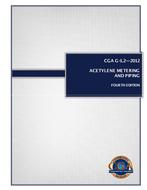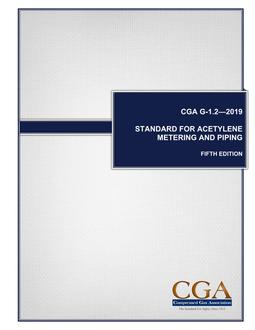CGA G-1.2
Click here to purchase
Comprehensive coverage of all aspects of metering and pipeline transmission of acetylene gas at low and medium pressures. Specifically details industry practices on meter types, accessories, construction, maintenance and installation, as well as acetylene piping and storage recommendations. Includes sections discussing the properties of acetylene gas, such as compressibility and base condition conversion. Lastly, there is a review of acetylene deflagration and detonation and the conditions under which each occur.
Product Details
- Edition:
- 4th
- Published:
- 10/22/2012
- Number of Pages:
- 44
- File Size:
- 1 file , 1.1 MB
CGA G-1.2
Click here to purchase
CGA G-1.2 is composed of three parts. The first part deals with properties of acetylene, the second part deals with pipeline acetylene transmission, and the third part deals with acetylene piping. In each part the included data are a compilation of practices, which have evolved through the years and have been demonstrated experimentally by test to be pertinent to the safe metering and transmission of acetylene.
The scope of this publication is limited to a maximum working pressure of 400 psi (2760 kPa). The data also covers acetylene of purity greater than 99.5% on a dry basis; no attempt has been made to include the use of mixtures of acetylene and other gases.
Section 6 through Section 10 covers recommendations for acetylene metering. While the primary consideration is concerned with large-volume meters, information is also included on small-volume meters. A complete tabulation of the pertinent physical and chemical properties of the gas is included in Section 4. For more information, see CGA G-1, Acetylene. It is recommended that standard conditions be based on clean, water-saturated acetylene at 14.73 psia and 60 °F (102 kPa, abs and 15.6 °C), although the data in this report are applicable to other base conditions.
Sections 11 through 15 are a review of the various components of an acetylene piping system. Section 16 discusses the general explosive behavior of acetylene in piping systems on the basis of numerous tests and observations that have been made over many years. Primary consideration was given to those properties peculiar to acetylene and requiring special handling techniques and protective measures. In addition to those special techniques required by the unstable nature of acetylene, precautions in construction and operation formally applicable to flammable gases shall be observed.
Product Details
- Edition:
- 5th
- Published:
- 12/17/2019
- Number of Pages:
- 48
- File Size:
- 1 file , 2.5 MB

